
Poker is a card game in which players place chips (representing money, for which the game is almost always played) into a pot, according to rules set out by the specific poker variant being played. During each betting interval, one player has the privilege or obligation to make the first bet and everyone else must choose whether to call or raise. The player who raises must make a contribution to the pot at least equal to the total amount contributed by all players before him.
There are a lot of skills required to be successful at poker, including discipline and perseverance. It also requires a keen focus so that you are not easily distracted by external factors. Concentrating and observing your fellow players allows you to pick up on tells, changes in body language, and other minute variations, which can make a big difference in your long-term success.
In addition, poker is a game that improves your critical thinking and problem-solving abilities. You will learn to make quick decisions under pressure, which can be useful in any number of situations away from the poker table. Moreover, it is a good way to get your math skills in order, as you’ll be dealing with odds, percentages, and other numbers all the time.
Another skill that poker teaches you is patience. In the beginning, you may not win every hand, but if you stay patient and continue to study your game, you will eventually become a better player. This is because you will have a greater understanding of how the game works, and you’ll be able to play more confidently knowing that you are making smart decisions.
If you want to learn how to play poker, it is important to practice with friends or in a real casino. This will help you develop your skills more quickly, and you’ll be able to practice different strategies without risking any of your own money. In addition, you’ll be able to see how other people play the game and use their mistakes to improve your own technique.
Aside from the fact that poker is a fun and social game, it also teaches you about the fundamentals of probability and statistics. This information will be helpful in other areas of your life, such as investing or predicting outcomes in sports and politics.
Lastly, poker is a great way to improve your interpersonal skills. You will learn how to read other people’s faces and bodies, and understand their emotions. You’ll also be able to identify their strengths and weaknesses, which will be valuable in many aspects of your life. Moreover, poker can teach you how to handle your own emotions and overcome bad luck. This will help you become a more mature person and will increase your confidence in other situations as well.